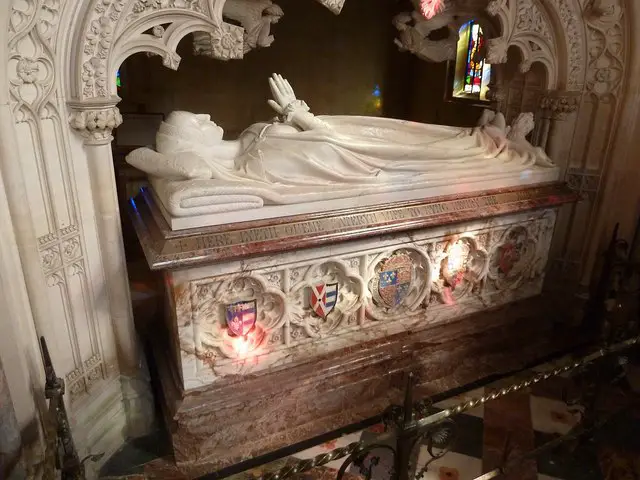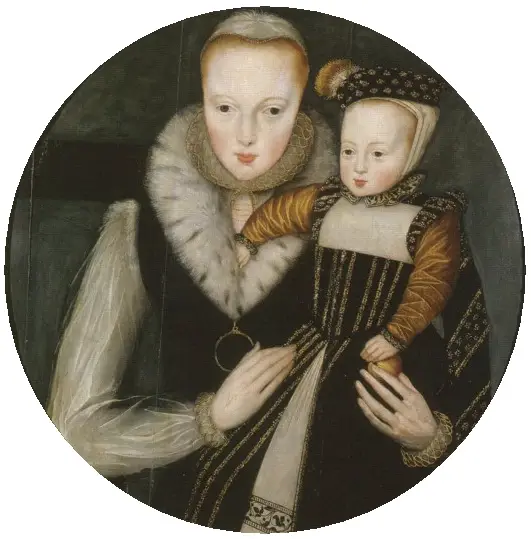29 August
1503 – Death of Oliver King, Bishop of Bath and Wells, diplomat, former Secretary to Edward V and Registrar of the Order of the Garter.
1538 – Arrest of Geoffrey Pole on suspicion of being in contact with his brother, Cardinal Reginald Pole, who had denounced the King and his policies in his treatise, Pro ecclesiasticae unitatis defensione.
1582 – Death of Sir Thomas Offley, Mayor of London, in London. He was buried in the church of St Andrew Undershaft.
1583 – Death of Maurice Browne, courtier, adventurer and mariner. Browne captained The Swallow and then The Delight on a venture to colonise North America in 1583. The venture failed and Browne, and the voyage leader, Sir Humphrey Gilbert, both died.
1584 – Death of Lucas de Heere, the Flemish painter and poet, probably in Paris. His works included “Solomon and Sheba” (1559) in which de Heere gave Solomon the face of Philip II of Spain.
1599 – Death of Henry Charteris, Scottish printer and bookseller.
30 August
1501 – Death of Thomas Grey, 1st Marquis of Dorset, courtier and son of Elizabeth Woodville by her first husband, Sir John Grey of Groby. Dorset was buried in the collegiate church of Astley in Warwickshire.
1525 - The Treaty of the More, negotiated by Cardinal Thomas Wolsey, was agreed by Henry VIII and Louise of Savoy, who was acting as regent while Francis I was imprisoned by Imperial forces. He had been captured at the Battle of Pavia. It was an about-face for Wolsey as he had, in the recent past, been allying England with the Empire, rather than France. By the terms of the treaty, Henry VIII agreed to help secure Francis I's release, and to give up claims to several French territories. In return, France was to award England with a pension of £20,000 per year.
The treaty was known as the Treaty of the More because negotiations took place at Wolsey’s property in Hertfordshire, “The More”.
1534 – Death of Thomas Belchiam, Observant Franciscan friar and Catholic martyr. The twenty-eight year old friar was starved to death at Newgate Prison. Belchiam had allegedly called the King a heretic. It is also alleged that there was an earthquake at the time of his death.
1548 - Mary Seymour, daughter and only child of Catherine Parr, Queen Dowager, and Thomas Seymour, Baron Seymour of Sudeley, was born at Sudeley Castle in Gloucestershire. Mary disappears from the records before she even reached the age of two and her fate is unknown.
1582 – Death of Richard Curteys, Bishop of Chichester. He was buried at Chichester Cathedral. In 1600, a collection of ten of his sermons on Psalm 25 was published as “The Care of a Christian Conscience”.
1595 – Death of William Vaux, 3rd Baron Vaux, English peer and Catholic recusant. He was imprisoned in Elizabeth I's reign for his Catholic faith and for harbouring Edmund Campion, a Jesuit priest.
1596 – Death of George Gower, English portrait painter and Sergeant Painter to Elizabeth I, in the parish of St Clement Danes in London. He was buried at the church there.
31 August
1545 – A contagious disease known as the 'Bloody flux' hit Portsmouth, killing many men serving on the ships stationed there. It had already been recorded in Plymouth, at the beginning of August - "that there is a great disease fallen amongst the soldiers and mariners almost in every ship" - and Thomas Poynings had written to the king from Boulogne on 15th August, commenting that he was "somewhat diseased with the bloody flux".
1555 - Robert Samuel, former minister of East Bergholt Church in Suffolk, was burned at the stake in Ipswich, probably at the Cornhill. He was one of the Ipswich Martyrs. Click here to find out more.
1580 – Death of Wiliam Llŷn, the Welsh language poet and elegist, at Oswestry.
1613 – Death of Matthew Baker, shipwright and first man to record ship designs on paper. His papers were catalogued by Samuel Pepys as "Fragments of ancient English shipwrightry".
1 September
1532 - Henry VIII made Anne Boleyn Marquis of Pembroke, a title in her own right, to “fit” her for the European stage and in readiness for the couple's upcoming meeting with King Francis I of France.
1566 – Birth of Edward Alleyn, actor, theatre entrepreneur and founder of Dulwich College and Alleyn's School, in the parish of St Botolph without Bishopsgate, London. Alleyn was a major figure in the Elizabethan theatre, being a member of the Earl of Worcester's Players, Lord Strange's Men and then leading the Admiral's Men. In the 1590s, he played title roles in “Doctor Faustus”, “Tamburlaine”, and “The Jew of Malta” by Christopher Marlowe. The business side of his career saw him partnering with Philip Henslowe and becoming part owner of the Rose Theatre, the Paris Garden and the Fortune Theatre.
1599 – Death of Dorcas Martin (née Eccleston), Lady Martin, translator, bookseller and Puritan. She was buried at All Hallows, Tottenham. Dorcas was married to Sir Richard Martin, Master of the Mint and Lord Mayor of London, and is known for her translations of prayers, psalms and catechisms.
1615 – Death of Sir Richard Knightley, member of Parliament, Sheriff of Northamptonshire and patron of Puritans, at Fawsley in Northamptonshire. Knightley was present at the executions of Anthony Babington and Mary, Queen of Scots, and was involved in the publication of the “Marprelate tracts”.
2 September
1507 (2nd or 3rd September) – Death of Thomas Savage, diplomat, Henry VII's Lieutenant and High Commissioner in York and Archbishop of York, at Cawood Castle. His body was buried at York Minster, but his heart was buried at Macclesfield, in one of the chapels at St Michael's Church.
1534 – Death of Gerald Fitzgerald, 9th Earl of Kildare and Lord Deputy of Ireland, in the Tower of London. An already ill Kildare had been arrested on 29th June 1534, accused of corruption and causing rebellion in Ireland. He was buried in the Chapel of St Peter ad Vincula at the Tower.
1554 – Anthony Browne, son of Sir Anthony Browne, was created 1st Viscount Montagu as part of the celebrations for Mary I's marriage to Philip of Spain.
1591 - Naval commander and explorer Sir Richard Grenville died at sea from injuries sustained while commanding his ship, The Revenge, in the Battle of Flores in the Azores.
3 September
1553 – Edward Courtenay was created Earl of Devon. He had been imprisoned in 1538, at the age of twelve, due to his family's links with the Poles and Nevilles, but was released shortly after the accession of Mary I.
1557 - News reached London that the English and Imperial troops had been successful in storming St Quentin, and there were widespread celebrations; bonfires were lit, bells were rung and there was singing. The good news was marred, however, by news of the death of Henry Dudley.
1588 (3rd or 5th September) – Death of Richard Tarlton, actor and famous clown, in Shoreditch. He was buried in St Leonard's Church, Shoreditch. Tarlton was a member of the Queen's Men, but is famed for his post-play jigs as a clown.
1592 – Death of writer and playwright Robert Greene in Dowgate. He died from a fever and was buried in a churchyard near Bedlam. Greene was a prolific writer, writing autobiographical works, plays and romances, but is best known for his pamphlet “Greene's Groats-worth of Wit bought with a Million of Repentance”, which is the first contemporary reference to William Shakespeare. It was actually an attack on Shakespeare, whom Greene accused of plagiarism, and of being uneducated.
1597 – Death of Sir John Norreys (Norris), military commander, at his brother Thomas's home, Norris Castle in Mallow, co. Cork. He died in his brother's arms, and it is thought that his death was due to trouble from old wounds, perhaps gangrene. Norris served as a soldier in France, the Low Countries and Ireland.
4 September
1504 – Birth of Antoine de Noailles, soldier and French diplomat at the English court in Mary I's reign, at Château de la Fage.
1539 - William, Duke of Cleves, signed the marriage treaty promising his sister, Anne of Cleves, in marriage to King Henry VIII. The Duke then sent the treaty to England, where it was ratified and concluded by early October.
1550 – Death of Sir Thomas Paston, Gentleman of the Privy Chamber in the reigns of Henry VIII and Edward VI.
1588 - Robert Dudley, Earl of Leicester died at his lodge at Cornbury, near Woodstock in Oxfordshire.
He had been ill for some time with a recurring stomach ailment, and so had decided to travel to Buxton to take the waters, but he died on the way.
1590 – Death of Sir James Croft, Lord Deputy of Ireland, member of Parliament and conspirator. Croft was one of the leaders of Wyatt's Rebellion in 1554, but although he was sentenced to death for treason, he was eventually released and pardoned. He served Elizabeth I as Comptroller of the Household, but was imprisoned briefly in her reign for negotiating with the Duke of Parma without permission. Croft was buried at Westminster Abbey, in the Chapel of St John the Evangelist.









Leave a Reply